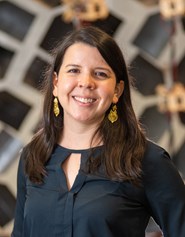
Associate Professor
Elena Vazquez, PhD. is a computational designer, researcher, and educator. Her work focuses on smart materials for adaptive buildings, and it has been supported by the American Institute of Architects Upjohn Research Initiative Grant and the Architectural Research Centers Consortium. Her interdisciplinary research bridges material science and computational design and has won awards such as the 2023 ARCC Dissertation Award, and the 2022 Rustum and Della Roy Innovation in Materials Research Award.
Elena holds a Ph.D. in Architecture, a Master of Science in Architecture, and a graduate certificate in Additive Manufacturing from Penn State. She obtained her professional degree in Architecture from the Universidad Nacional de Asunción. There, she founded an architecture studio with her partner and worked on several housing projects' design and construction supervision. Her master's work: "Perforated Masonry Walls: Creating a digital framework for optimizing environmental performance through shape configuration," has been recognized with the "Distinguished Master's Thesis Award," an acknowledgment of excellence in master's thesis research. In Spring 2018, she received the ARCC King Medal for Excellence in Architectural and Environmental Research.
As a computational designer, she has worked and collaborated with architecture studios and manufacturing companies such as SOM, Zahner, and BamCore. In addition, she has extensively published in computer-aided architectural design proceedings, including eCAADe, Sigradi, Caadria, and CAADFutures, and peer-reviewed journals. Elena is a 2016-2018 Fulbright scholar, a 2020-2021 Waddell Biggart Graduate Fellow, and a 2021-2022 Freiburg Rising Star.
I use a computational approach to teaching architectural design. Taking inspiration from baking shows, I develop project-based assignments for my students.
Computational designers are toolmakers that craft scripts to solve architectural design problems. When teaching digital design, students learn to make tools for real-life design problems. In my Parametric Design class, they watch video tutorials before class and then are challenged with a digital tool-making assignment during class. For example, they analyze an aluminum facade and then create a script to generate a similar design. By relying on real examples, students immediately understand the applicability of what they learn and report feeling comfortable with new parametric design software.
When teaching design studio, students learn computational design concepts through a series of short projects that build to a final design throughout the semester. For instance, an in-class assignment asks novice designers to develop five quick paper models to express different designs based on making rules such as adding, folding, or cutting. They produce these paper models and then select the rules that they find more helpful in conceptualizing their design ideas for further iterations. The assignment helps them understand that rule-based making can elicit design intents while providing a framework for explorations. These computational approaches to design are strategies that students will take with them and implement in future projects.
In sum, my pedagogical approaches engage students in project-centered learning and provide them with frameworks and computational strategies that will remain with them long after leaving my classroom. I have experience teaching: Architecture Studio, Robotics in Architecture, Parametric Design, Shape Grammars, Resilient and Sustainable design.